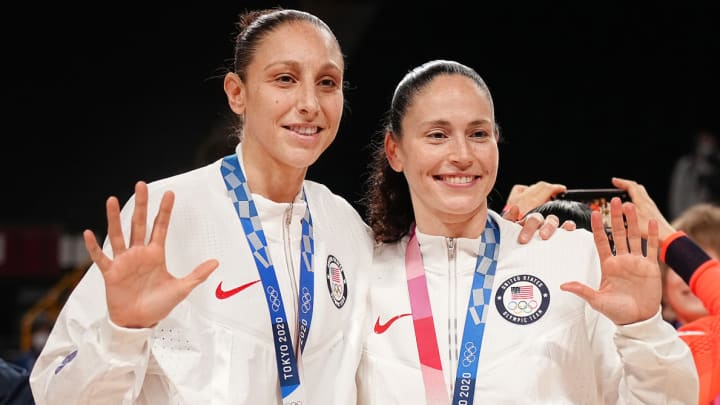Five Golds Later, Taurasi and Bird Leave U.S. Women's Basketball In Top Shape

SAITAMA, JAPAN – Sue Bird and Diana Taurasi swear this is hard. We’ll have to trust them on that. For the fifth time, they are each leaving the Olympics with a gold medal, a record that defies nothing. They and their USA basketball program have done everything so well, for so long, that greatness is assumed.
Since 1996, the U.S. has won seven straight gold medals. They have won 54 straight games. They won 52 of those by double digits, and one of the single-digit games was a nine-point win over Nigeria this year that wasn’t really that close. In their 90–75 gold-medal game win over Japan Sunday, the U.S. had at least a three-possession lead for the final 36 minutes.
So when you hear Taurasi say “We didn’t really know who we were at the beginning” of the tournament, you might be so skeptical that your eyebrows rise above your hairline. But the U.S. cannot just show up and win gold. It wins, in part, because everybody involved knows that.
What Bird and Taurasi have done is both exceptional and expected—exceptional because they are the first basketball players to win five gold medals, and expected because of the program they represent. The U.S wins gold, and players stick around.
The medal streak started in 1996. Not coincidentally, 1996 was the year the WNBA was founded. It began play the next year. The WNBA is now a fixture on the American sports landscape, and it probably has the best relationship with any individual Olympic team of any sports league in the world.
The 1992 bronze-winning U.S. squad did not have one player who was 30 or older. This one has six. Taurasi is 39. Bird is 40. The WNBA has made it easier to be an elite player for so long, and those elite players maintain the USA Basketball culture. Bird remembered the first Games for her and Taurasi, in Athens in 2004, when Dawn Staley was an American star. Neither Bird nor Taurasi, both former UConn stars, started a game.
“In the ’04 games, I was there to learn and take the torch from Dawn and carry it,” Bird said. “And those older players taught us what it meant.”
The most talented American girls can expect to have long basketball careers in their home country, and the best American pros want to play in the Olympics and have full support of their league. The men’s team is great, but there are still agents and owners who would rather see stars skip the Olympics—and many of those stars do.
For American women, the Olympics are an essential part of their career. Nobody has to plead with them to play. As Staley said “the committee has a hard time selecting 12.” Taurasi said after these Olympics were postponed, she would text Bird every week to let her know how many days they had.
“Sue and I were like, ‘We might not make it,’” Taurasi said. “‘They might not have it for us.’”
The WNBA has also drastically improved the overall quality of women’s basketball in the United States. Here in Tokyo, the U.S. played a fluid inside-out game that was basically slump-proof because its biggest players are so skilled. The American’s three leading scorers in this tournament were three of its tallest: Wilson, Breanna Stewart, and Brittney Griner.
The U.S. only attempted 13 three-pointers against Japan and made just four. But the Americans shot 59% from two-point range. Japan shot 43%. Griner made 14 of 18 shots and scored 30 points. Taurasi, Griner’s Phoenix Mercury teammate, said sometimes Griner doesn’t even realize how good she can be. But everybody on the team understood how good the U.S. could be—and was expected to be. The presence of Bird and Taurasi ensured it.
“I would sit in the locker room like, 'They really did this five times?'” said Wilson, who is 25 and played in her first Olympics. “At the Opening Ceremony, I was like, 'Five times? My feet hurt!' It really makes you want to come back and continue to give and continue to … build for the next generation.”
She laughed and said, “I don't know if I got five in me, but we'll see.”
Bird said she does not have six in her: “This is my last one. No one has to ask about it anymore.” She ended by winning the game as her fiancée, soccer star Megan Rapinoe gamed the system: “Megan somehow finagled a media credential and got herself in this arena today.”
Bird said what she will really miss is not the medal ceremonies but something even more routine for her: “What I’m going to miss the most are the bus rides and the camaraderie and the dumb jokes.” She and Taurasi go home knowing that the national program they inherited is even stronger now. The biggest compliment you can pay them is that USA Basketball probably won’t miss them at all.
More Olympics Coverage:
• Ariel Torres Wins the First-Ever U.S. Karate Medal
• Sadulaev Overpowers Snyder in Titanic Clash for Gold
• Allyson Felix's Dignified Finish Sets Up a Promising Future
• Durant Cements Status as Best Ever U.S. Olympic Men's Basketball Player

Michael Rosenberg is a senior writer for Sports Illustrated, covering any and all sports. He writes columns, profiles and investigative stories and has covered almost every major sporting event. He joined SI in 2012 after working at the Detroit Free Press for 13 years, eight of them as a columnist. Rosenberg is the author of "War As They Knew It: Woody Hayes, Bo Schembechler and America in a Time of Unrest." Several of his stories also have been published in collections of the year's best sportswriting. He is married with three children.
Follow rosenberg_mike